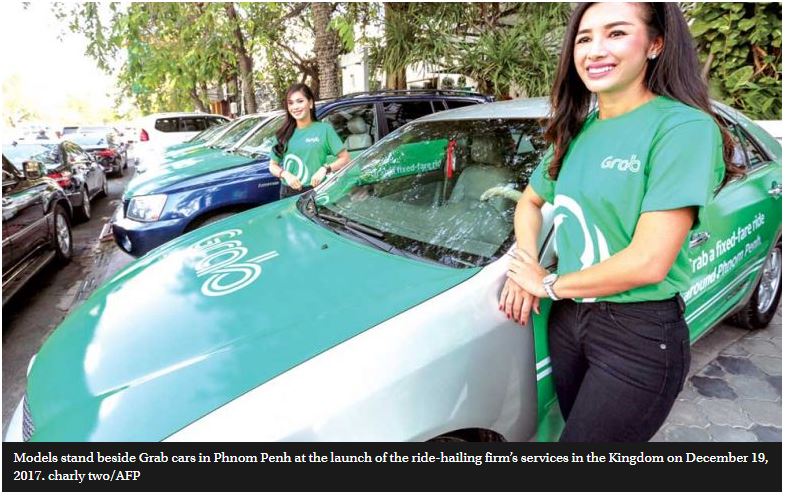Cambodia: End of the road? Ride-hail apps face future
WHEN Hor Daluch established the Kingdom’s first-ever ride-hailing app Exnet Taxi Cambodia in April 2016, his main challenge at the time was to convince Cambodians of the benefit of using technology for their daily commutes.
Daluch introduced his ride-hailing service at a time when Cambodians were still unfamiliar with the concept. But customers have gradually warmed to the concept as more operators continue to enter a now saturated ride-hailing market.
But more players mean more competition, and Daluch is now facing a new challenge – one rattling his business hard.
“There are about 10 companies offering the same service in a small market, so we are now in a very tough situation due to competition. For small players, if we don’t find a suitable business model to adjust to the change, we may disappear from the marketplace someday soon,” he said.
Competition in the ride-hailing app market is heating up and Exnet Taxi Cambodia is not the only one negatively impacted by increased competition, as rivals struggle over market share in order to survive.
While there are currently around 11 ride-hailing apps in Cambodia, Daluch predicts that in the future large players will dominate the market, as their financial capacity and technological expertise allow them to eclipse smaller competition.
Ride-hailing apps operating in Cambodia include Exnet Taxi Cambodia, WeGo, ITSUMO, GO-X, TOS, Well, CityApp, CamGO and 711. But the market is dominated by two major players – PassApp and Grab.
The Post interviewed 10 tuk-tuk drivers in the capital about ride-hailing apps in the Kingdom. Most could only name a few and are only registered with PassApp and Grab, saying passengers mostly book their services through those two apps.
Thy Sopha, 37, whose tuk-tuk is registered on both Pass-App and Grab, said he is booked often through the two apps because they are the most well-known by Cambodians.
“It is not necessary to register with all [ride-hailing firms]. We just register with the apps that most people are using and I think having PassApp and Grab accounts is enough,” Sopha said.
Local ride-hailing firms have invested less in advertising and have had fewer promotions. In addition, since many of them do not have enough tuk-tuk and car drivers registered, passengers often experience long waiting times. This has contributed to the domination by Pass-App and Grab.
Prav Vichet, an IT professional at a private firm in Phnom Penh, said he recently downloaded the Grab app to his phone as he is attracted by the company’s regular promotions and discount programmes.
“I don’t want to download many apps with the same function to my phone. So, I just have one or two and I select a good one where it is easy to call drivers and have good promotions,” he said.
Cambodian ride-hailing app PassApp’s founder and CEO Top Nimol said many Cambodians are aware of the advantages of the app and know how to use it for their commutes in town. He said two million people have downloaded the app nationwide, mostly in Phnom Penh.
Despite the increase in the number of passenger using the app, Nimol said the market is currently too small for the 11 or so ride-hailing companies to operate.
“The market is not so big and some operators are just jumping into the business, following others they see succeeding,” he said. “Some are not operating well because the market is very competitive.”
Nimol said he is not worried about the increased competition as his service has seen increased use by locals month to month. He declined to release the exact number of drivers registered and the volume of commuters using PassApp, saying the information is confidential.
Grab Cambodia Country Marketing Head Heng Sotheavy said on Tuesday that Grab has expanded to Siem Reap and more areas of Phnom Penh after officially launching in the Kingdom late last year and seeing a spike in the number of drivers.
“As more and more Cambodians come to experience and understand the convenience and safety of ride-hailing transport, we are confident that the market will continue to grow to meet their needs and expectations,” he said.
Daluch said the increasing popularity of Grab in Cambodia should be a worrying trend for local ride-hailing companies, as the regional firm’s access to funds and technology risk blowing the competition away.
What do the local firms have up their sleeves in response? The Exnet Taxi Cambodia founder said his firm plans to introduce a new system for drivers which will be free of charge, and lower rates for passengers using the app.
“The competitive landscape no longer makes it sustainable for ride-hailing operators to depend solely on commissions from drivers,” said Daluch. “To survive, we need to create a new business model.”
Source: https://www.phnompenhpost.com/post-depth-business/end-road-ride-hail-apps-face-future


 Thailand
Thailand





